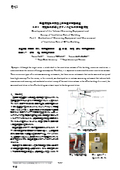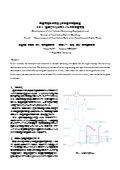[Joint Research with Tokyo Denki University] Measuring airtightness and ventilation airflow of detached and multi-family houses with a single device.
【Air Tightness Measurement】 - By being installed indoors, it can accommodate both depressurization and pressurization measurements, making it less susceptible to the effects of wind that can be problematic when installed outdoors. - It automatically measures and displays/records up to 10 points of indoor/outdoor differential pressure between 10 to 50 Pa (arbitrary). In high airtightness houses, the gap area is small, resulting in low airflow, but it can be measured with high precision up to 10 m³/h. - For airflow measurement, we use a differential pressure type pitot tube with rectifying function called 'Air Measure', which is calibrated with suction nozzles (JIS standard calibrated products) for each product. - The measurement method complies with JIS A 2201. By using a suitable micro differential pressure gauge (with automatic switching detection using two-stage differential pressure ranges) and Air Measure, we enhance the reliability of the measurement values. 【Ventilation Airflow】 - To ensure that the pressure difference inside and outside the collection hood is '0', the airflow of the auxiliary fan is controlled by PID, eliminating human error. - With the measuring equipment installed indoors, both supply and exhaust airflow can be measured simply by changing the flexible duct. - It can measure airflow with high precision up to 10 m³/h, making it possible to measure the airflow of natural air supply openings in living spaces. *NETIS Registration Number: KT-240015-A
Inquire About This Product
basic information
■Airflow Measurement - Air Meter: Suitable diameter air meter (compared with JIS B8330 suction nozzle) - Differential Pressure Gauge: Standard 50Pa/500Pa (with inspection certificate) ■Static Pressure Measurement - Differential Pressure Gauge: Standard ±100Pa (with inspection certificate) ■Temperature Measurement - Pt100: With inspection certificate *For more details, please refer to the PDF document or feel free to contact us.
Price range
Delivery Time
Applications/Examples of results
◇ Utilization in Buildings → Confirming whether the intake of outside air, ventilation volume, and suction airflow of smoke exhaust outlets meet building code standards. → Evaluation of airtightness (eliminating waste in heating and cooling). *Examples: Single-family homes / Multi-family residences / Kitchens / Garages / Water heating rooms / Smoke exhaust systems ◇ Utilization in the Development Stage of Equipment with Heat Sources → Easily obtaining selection criteria for cooling fans built into the equipment. (The temperature rise within the equipment can lead to performance degradation and reduced product lifespan.) → Verification that the selected cooling fan meets the specified performance. *Examples: Display devices for stores, audiovisual equipment such as projectors / Medical devices like MRI and electrocardiograms / Control panels for indoor and outdoor use, arc welding machines, etc. ◇ Utilization for Prototype Evaluation and Performance Verification of Heat Exchangers → By generating a constant airflow, the airflow conditions can be repeatedly reproduced, allowing for the exploration of better shapes for heat dissipation and heat absorption fins. (The performance of heat exchangers is governed by the shape of the fins and the surrounding airflow conditions.) *Examples: Indoor and outdoor units of air conditioning systems, car radiators, etc. ◇ Performance Evaluation of Equipment that Generates Airflow → The volume of air is also an important governing factor for devices such as air purifiers, dryers, and hair dryers. *Examples: Air conditioners, dust collectors, exhaust fans, etc.
catalog(5)
Download All Catalogs


Company information
As a specialized company focused on airflow measurement, we manufacture and sell the airflow meter "Air Measure," which incorporates a uniquely designed rectifying grid and a porous Pitot tube, and we have enabled on-site measurements of various ducts through the establishment of the "Gas Trace Method (Mixed Dilution Method)," which differs from conventional airflow measurement methods.











